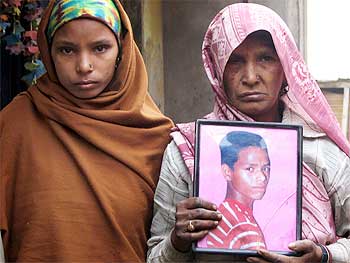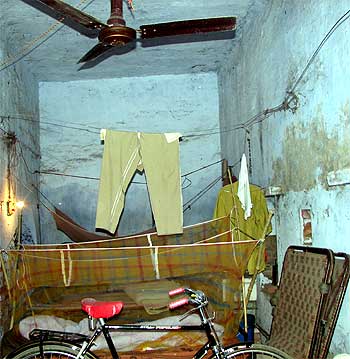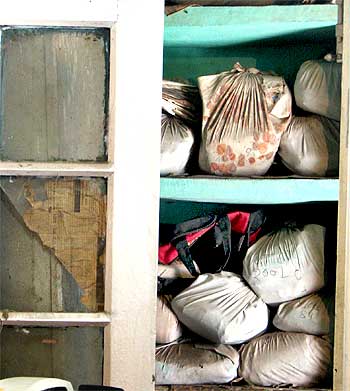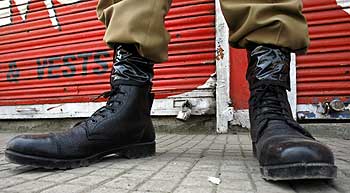Photographs: Human Rights Watch
The report slammed successive governments at the centre for failing to deliver on promises to hold the police accountable for abuses and to build professional, rights-respecting police forces.
The 118-page report, Broken System: Dysfunction, Abuse and Impunity in the Indian Police, documents a range of human rights violations committed by police, including arbitrary arrest and detention, torture and extrajudicial killings.
'Govt must stop talking about reform and fix the system'
Image: A police stattion in Bangalore armed with World War era weaponsIt documents the failings of state police forces that operate outside the law, lack sufficient ethical and professional standards, are overstretched and outmatched by criminal elements, and unable to cope with increasing demands and public expectations.
Field research was conducted in 19 police stations in Uttar Pradesh, Karnataka, Himachal Pradesh, and the capital, New Delhi.
"India is modernising rapidly, but the police continue to use their old methods: abuse and threats," said Brad Adams, Asia director at Human Rights Watch. "It's time for the government to stop talking about reform and fix the system."
'If I don't do eliminate him, I'll lose my position'
Image: A cramped police barrack in Varanasi, Uttar Pradesh."I am looking for my target," the officer said, adding, "I will eliminate him. I fear being put in jail, but if I don't do it, I'll lose my position."
Almost every police officer interviewed by Human Rights Watch was aware of the boundaries of the law, but many believed that unlawful methods, including illegal detention and torture, were necessary tactics of crime investigation and law enforcement.
'Abysmal conditions for cops contribute to violations'
Image: Records stacked up in a police station in BengaluruInstead of shifts, many work long hours, sometimes living in tents or filthy barracks at the police station. Many are separated from their families for long stretches of time. They often lack necessary equipment, including vehicles, mobile phones, investigative tools and even paper on which to record complaints and make notes.
Police officers told Human Rights Watch that they used 'short-cuts' to cope with overwhelming workloads and insufficient resources. For instance, they described how they or others cut caseloads by refusing to register crime complaints. Many officers described facing unrealistic pressure from their superiors to solve cases quickly.
'Supects are held illegally and coerced to confess'
Image: Evidence stored in sheets at an unprotected area of a police stationReceiving little or no encouragement to collect forensic evidence and witness statements, tactics considered time-consuming, they instead held suspects illegally and coerced them to confess, frequently using torture and ill-treatment.
'Conditions and incentives for police officers need to change,' Adams said. 'Officers should not be put into a position where they think they have to turn to abuse to meet superiors' demands, or obey orders to abuse. Instead they should be given the resources, training, equipment, and encouragement to act professionally and ethically.'
The HRW report also documents the particular vulnerability to police abuse of traditionally marginalised groups in India. They include the poor, women, Dalits (so-called 'untouchables'), and religious and sexual minorities.
'Colonial-era police laws enable political interference'
Image: A policeman stands guard in front of closed shops during a strike in KashmirPhotographs: Fayaz Kabli/Reuters
Colonial-era police laws enable state and local politicians to interfere routinely in police operations, sometimes directing police officers to drop investigations against people with political connections, including known criminals, and to harass or file false charges against political opponents. These practices corrode public confidence.
In 2006, a landmark Supreme Court judgment mandated reform of police laws. But the central government and most state governments have either significantly or completely failed to implement the court's order, suggesting that officials have yet to accept the urgency of comprehensive police reform, including the need to hold police accountable for human rights violations.
'Police force that thinks it is above the law'
Image: An activist holds a placard to mark the World Human Rights Day in SrinagarPhotographs: Danish Ismail/Reuters
"India's status as the world's largest democracy is undermined by a police force that thinks it is above the law," said Adams. "It's a vicious cycle. Indians avoid contact with the police out of fear. So crimes go unreported and unpunished, and the police can't get the cooperation they need from the public to prevent and solve crimes."
The report also sets out detailed recommendations for police reform drawn from studies by government commissions, former Indian police, and Indian groups. Among the major recommendations are:
- Require the police to read suspects their rights upon arrest or any detention, which will increase institutional acceptance of these safeguards;
- Exclude from court any evidence police obtain by using torture or cruel, inhuman, or degrading treatment in suspect interrogations;
- Bolster independent investigations into complaints of police abuse and misconduct through national and state human rights commissions and police complaints authorities; and
- Improve training and equipment, including strengthening the crime-investigation curriculum at police academies, training low-ranking officers to assist in crime investigations, and providing basic forensic equipment to every police officer.








article